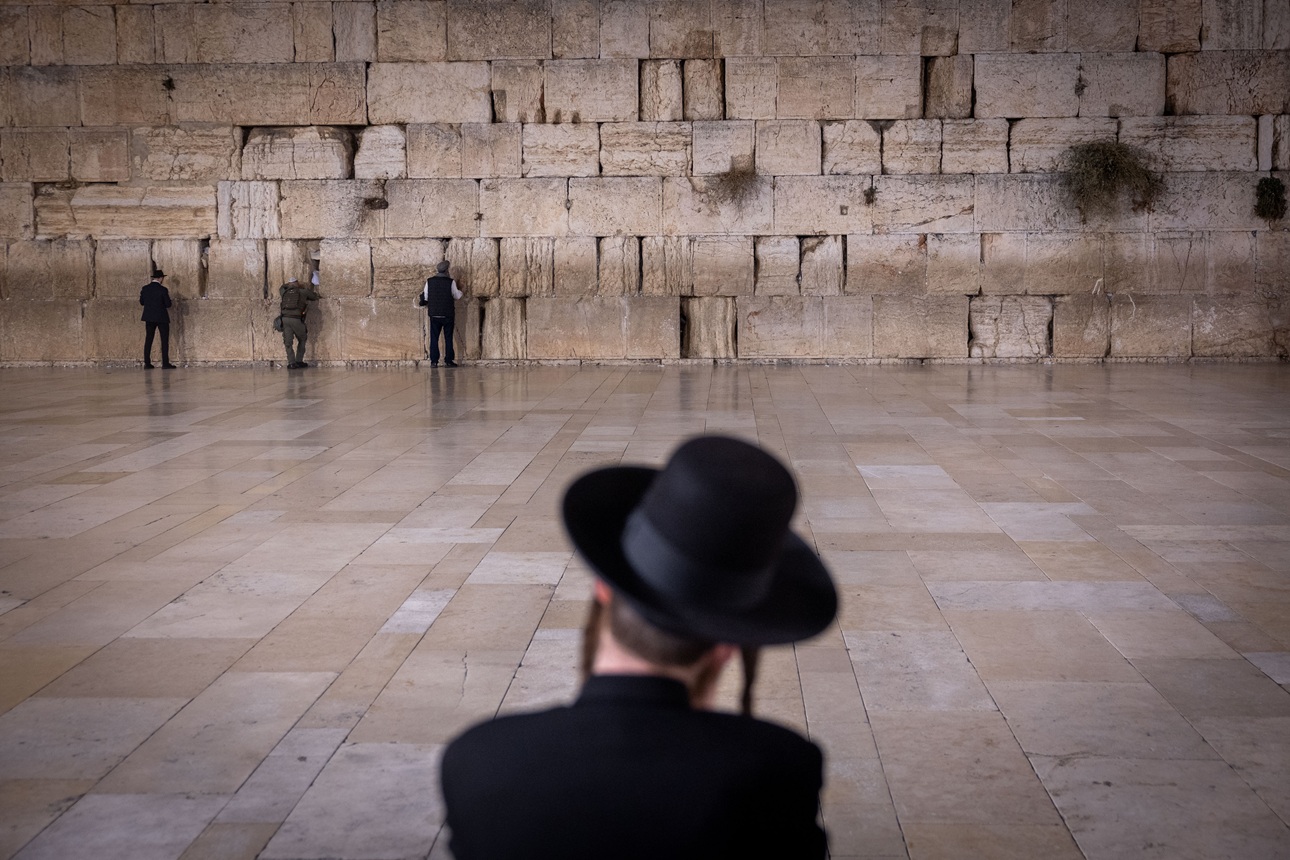Yom Kippur Reflections: The Forgiveness Haredi Leadership Ought to Seek
Drawing on the prayer of atonement on Yom Kippur, the authors call on Israel's ultra-Orthodox (Haredi) leadership to seek forgiveness for refusing to share in Israel’s burdens, denying opportunity to its youth, and clinging to privilege without meeting obligations.

Photo by Yonatan Sindel/Flash90
The past two years have brought painful crises to Israeli society, crises that often seem to have no way out. One of the deepest and most volatile fault lines is that between the Haredi (ultra-Orthodox) community and the broader public that serves in the military, fully participates in the economy, and is engaged in all aspects of public life. More precisely, the tension lies between the rabbinical-spiritual and especially the political leadership of the Haredim, on one side, and the non-Haredi leadership and the public it represents, on the other.
Despite the upheavals shaking Israeli society, the Haredi leadership—beset though it may be by its own internal struggles—has failed to rise above narrow survival instincts, whether for itself or for its flock. Even after the shocking attacks of October 7 and the ensuring war and economic and societal challenges, it has not recalibrated its relationship with the broader public that continues to bear the burden of service, sacrifice, and national security.
Leadership that does not face reality with sobriety, innovation, and courage in the face of rapidly changing circumstances betrays both the resilience of its own community and the possibility of renewed understandings and shared life with other sectors of Israeli society. On the eve of Yom Kippur, the Haredi leadership owes both the Israeli public at large, and perhaps more importantly its own Haredi community, a profound and candid reckoning.
Here is a proposal, presented with modesty, for the renumeration of sins that the Haredi leadership should recite on this Day of Atonement:
For the Sin we Have Committed Before You of Stubbornness
For the sin of stubbornness and evasion, even in times of a bloody and protracted war. For the sin of refusing to shoulder the security burden, to stand alongside their fellow citizen in arms. For the sin of refusing compromise or explore creative solutions to the issue of mandatory military (or civilian-national) service for tens of thousands of Haredi men, particularly those unable or unwilling to continue full-time religious study.
For the Sin we Have Committed Before You by Not Using Our Minds
For the sin of blocking access to basic education and essential skills for Haredi boys. For the sin of failing to prepare young men for independent adult lives, all in the name of an exalted but unrealistic demand that every boy pursue intensive Talmud study as a sole way of life—something suitable only for a rare few.
For the Sin we Have Committed Before You with Haughty Eyes
For the sin of drawing vast privileges and resources for the Haredi community by exploiting Israel’s depleted welfare state. For the sin of demanding rights without the corresponding obligations of citizenship, made possible by the political capital of Haredi parties.
For the Sin we Have Committed Before You by Oppression, Anguish or Injustice to a Fellow-Jew
For the sin of blatant, institutionalized ethnic discrimination within the Haredi educational system, from preschool through high school. For the sin of excluding Mizrahi (of Middle Eastern descent) Haredi girls and boys, along with other minority groups, from equal opportunity. For the sin of ongoing discrimination that occasionally sparks cries of protest from within the community itself, to little avail.
For the Sin we Have Committed Before You Using Power and Influence
For the sin of discriminating between men and women, and for the sin of perpetuating this inequality through constant social policing and daily enforcement.
For the Sin we Have Committed Before You of Brazenness
For the sin of separating and alienating the Haredi community from wider Israeli society. For the sin of clinging to the illusion that the Haredim remain a small and fragile minority, as they may have been in the early years of the state, but no longer are. For the sin of ignoring the real obligation to contribute proportionally to Israel’s economic, social, and security resilience, in line with their growing share of the population and their central role within it.
On Desecrating God’s Name
For the sin of alienating countless Jews from their ancestral heritage. For the sin of associating Judaism with evasion, avoidance, and refusal to share in the collective burden, rather than with moral voice, responsibility, and accountability.-
For all these sins, whether committed willfully or as a result of negligence, openly or in secret, the Haredi leadership must express contrition and seek forgiveness, while turning toward painful yet necessary decisions backed by real change and concrete action.
The state ought to atone for longstanding sins as well – for operating under narrow political considerations when responsible, balanced, and strategic long-term planning was needed; for turning a blind eye and discrimination; for abandoning Haredi citizens, leaving them at the mercy of their leadership.
Only then will it be possible to restore trust between Israel’s many tribes and sectors, confront together the immense challenges facing the country, and secure a sustainable future for generations to come.
